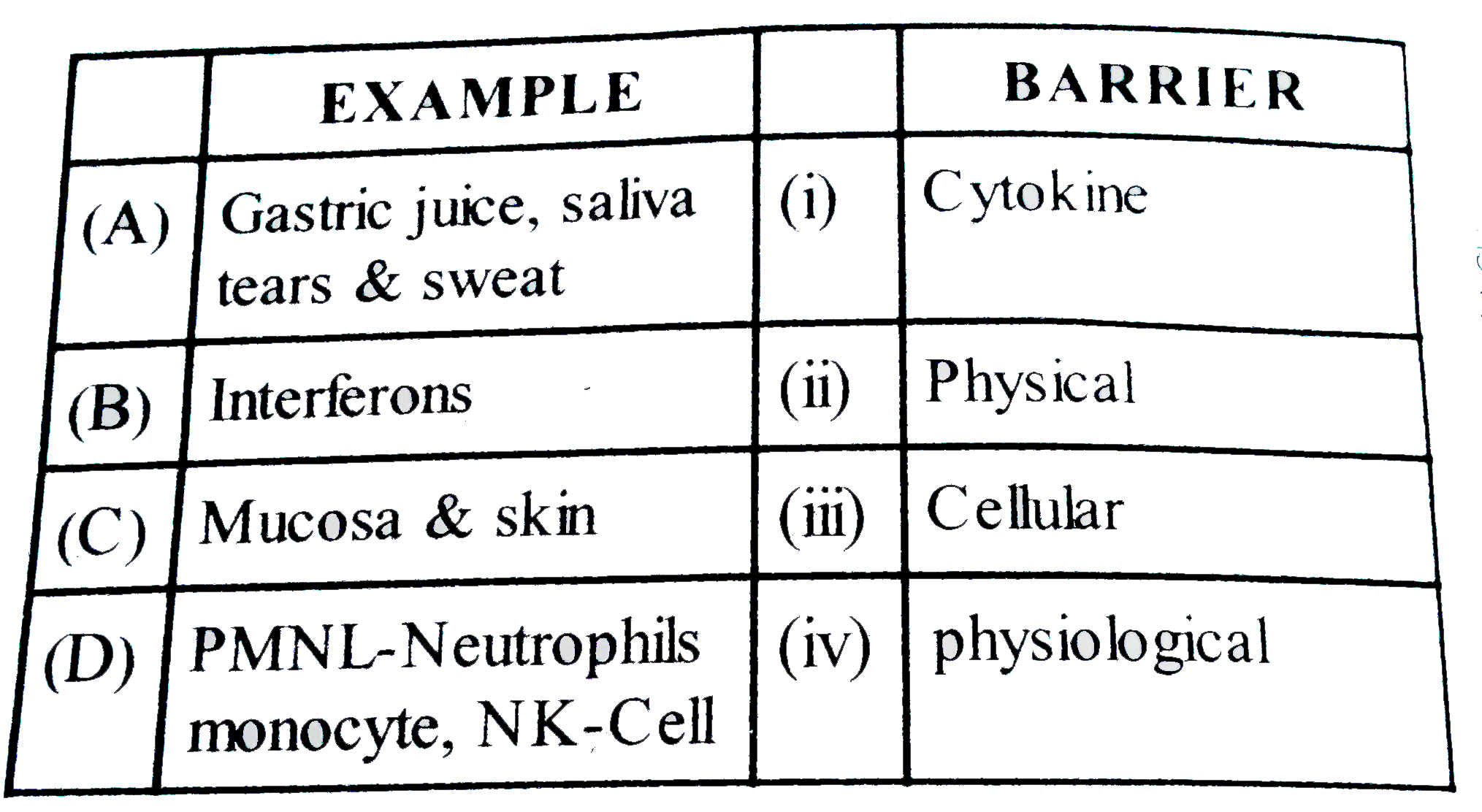The opposite to innate immunity is:
Passive immunity
T-cells immunity
Phagocytosis
Acquired immunity
The correct Answer is:D
To solve the question "The opposite to innate immunity is:", we can follow these steps:
1. Understand the Concept of Innate Immunity:
- Innate immunity is the body's first line of defense against pathogens. It includes physical barriers (like skin), chemical barriers (like stomach acid), and immune responses that are non-specific and immediate.
2. Identify the Two Main Types of Immunity:
- The immune system is primarily divided into two categories:
- Innate Immunity: Non-specific, immediate response.
- Acquired Immunity: Specific response that develops over time and involves memory.
3. Analyze the Options Provided:
- Option 1: Passive Immunity: Refers to the transfer of antibodies from one individual to another. It is a type of acquired immunity but not the direct opposite of innate immunity.
- Option 2: T Cell Immunity: Refers to the immune response mediated by T cells, which is part of acquired immunity, but not the opposite of innate immunity.
- Option 3: Phagocytosis: This is a process carried out by certain cells (phagocytes) to engulf and digest pathogens. It is a mechanism of innate immunity, not the opposite.
- Option 4: Acquired Immunity: This is the specific immune response that develops after exposure to pathogens and involves memory cells (B cells and T cells).
4. Determine the Correct Answer:
- After evaluating all options, the most suitable answer that represents the opposite of innate immunity is Acquired Immunity.
5. Final Answer:
- The opposite to innate immunity is Acquired Immunity.
- Innate immunity is the body's first line of defense against pathogens. It includes physical barriers (like skin), chemical barriers (like stomach acid), and immune responses that are non-specific and immediate.
- The immune system is primarily divided into two categories:
- Innate Immunity: Non-specific, immediate response.
- Acquired Immunity: Specific response that develops over time and involves memory.
- Option 1: Passive Immunity: Refers to the transfer of antibodies from one individual to another. It is a type of acquired immunity but not the direct opposite of innate immunity.
- Option 2: T Cell Immunity: Refers to the immune response mediated by T cells, which is part of acquired immunity, but not the opposite of innate immunity.
- Option 3: Phagocytosis: This is a process carried out by certain cells (phagocytes) to engulf and digest pathogens. It is a mechanism of innate immunity, not the opposite.
- Option 4: Acquired Immunity: This is the specific immune response that develops after exposure to pathogens and involves memory cells (B cells and T cells).
- After evaluating all options, the most suitable answer that represents the opposite of innate immunity is Acquired Immunity.
- The opposite to innate immunity is Acquired Immunity.
Topper's Solved these Questions
- BOOK - CENGAGE BIOLOGY ENGLISHCHAPTER - HUMAN HEALTH AND DISEASEEXERCISE - ARCHIVES46videos
HUMAN HEALTH AND DISEASE
- BOOK - CENGAGE BIOLOGY ENGLISHCHAPTER - EVOLUTIONEXERCISE - Archives38videos
EVOLUTION
- BOOK - CENGAGE BIOLOGY ENGLISHCHAPTER - HUMAN REPRODUCTION EXERCISE - Assertion -Reasoning Question16videos
HUMAN REPRODUCTION
Similar Questions
Knowledge Check
- Question 1 - Select One
Which of the following statements regarding different barriers of innate immunity is not correct ?
AAcid present in the stomach saliva in the mouth, tears from the eyes prevent the growth of microorganisms and constitude physiological barriers of out body.BMucous membrane lining the respiratory, gastriontestinal and urinogenital tracts helps in ttrapping the microbes and costitute physiological barriers of our body.CCertain types of leucocytes such as polymorphonuclear leucocytes (PMNL- neutrophils ) and lymphocytes such as natural killer cells, constitute cellular barriers of our body.DVirus- infected cells secrete proteins called interferons which protect non- infected cells from further viral infection and constitute cytokine barriers of our body.
Which of the following statements regarding different barriers of innate immunity is not correct ?
View SolutionPhagocytes of innate immunity are
View SolutionPhagocytes of innate immunity are
View SolutionWhat are the barriers of innate immunity?
View SolutionIncorrect about innate immunity is :-
View SolutionAll the following are related to innate immunity except
View SolutionHow do cytokine barriers provide innate immunity in humans?
View Solution


